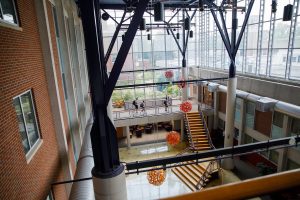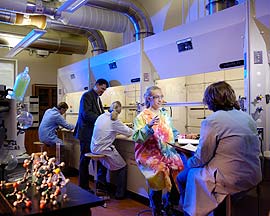Campus Facilities
Science Complex
 In 2006, Albion College dedicated a Science Complex that brings together the Departments of Chemistry, Biology, Physics, Geology and Mathematics to a single location. The complex is comprised of four buildings connected by a 7,000-sq.-ft. atrium. “Science on Display” was a guiding theme in the development of the complex. More than 90 percent of the classrooms and offices have views of the outside or atrium. Windows to the hallway give visitors a glimpse of what is going on in the laboratories and other learning environments. Research space for all disciplines are found throughout the complex.
In 2006, Albion College dedicated a Science Complex that brings together the Departments of Chemistry, Biology, Physics, Geology and Mathematics to a single location. The complex is comprised of four buildings connected by a 7,000-sq.-ft. atrium. “Science on Display” was a guiding theme in the development of the complex. More than 90 percent of the classrooms and offices have views of the outside or atrium. Windows to the hallway give visitors a glimpse of what is going on in the laboratories and other learning environments. Research space for all disciplines are found throughout the complex.
The Albion College Science Complex is the first building on campus to be built according to the “green building” practices established by the U.S. Green Building Council (USGBC). The complex received Silver Certification from the Leadership in Energy and Environmental Design (LEED) Green Building Rating System. The award plaque is on display on the ground floor of the atrium. In determining whether a building meets LEED standards, the USGBC examines performance in five key areas of human and environmental health: sustainable site development, water savings, energy efficiency, materials selection, and indoor environmental quality.
The Department of Chemistry is housed in two of these buildings; Putnam Hall, which was completely renovated in 2004, and Kresge Hall, which was built in 2006.
Bruce A. Kresge Hall
Mark E. Putnam Hall
This building was dedicated in 2006 in honor of Dr. Bruce A. Kresge. Dr. Kresge is a 1953 graduate and an honorary trustee of Albion College.
Teaching labs for introductory chemistry, inorganic chemistry, and organic chemistry are found on the top floor. Downdraft hoods in the intro and inorganic chemistry spaces help to maintain air quality. The organic labs are equipped with 12 six-foot ventilation hoods so students can learn chemical techniques and transformations in state-of-the-art facilities. Research space for organic and inorganic chemistry faculty can also be found on the top floor. All labs have six-foot ventilation hoods, according to the needs of the lab.
Biochemistry research and teachings spaces are found on the second floor. These spaces were designed to share a central preparation space that houses equipment used in both research and teaching applications. Proximity to the biology department encourages collaboration between students and faculty in the different disciplines.
The building is named after Dr. Mark E. Putnam, a former Vice President of the Dow Corporation and a member of the Albion College Board of Trustees. The top floor of the building houses faculty offices, research labs for analytical and physical chemistry, and an analytical chemistry teaching lab. The second floor has three “Enhanced Classrooms” with fixed projectors for computers, DVDs, and a port to plug in additional equipment.
Instrumentation
 The department is continually upgrading its instrumentation through Albion College equipment funds and recent grants from such organizations as the NSF, the Pittsburgh Conference Foundation, the Dow Foundation, and the Culpepper Foundation. Instrumentation includes two Gas Chromatography-Mass Spectrometers, a fluorescence spectrometer, two Fourier Transform Infrared Spectrometers (with ATR sampling), macroscale microwave reactor, six diode array UV-VIS spectrometers, and HPLC, GC, and IC chromatographs. Biochemistry is outfitted with a biochromatography system, UV/Vis – fluoresence microplate reader, among other standard equipment, The department also has an extensive collection of pH and specific ion electrodes, field conductivity measurement systems, two autotitrators, and a mercury dropping electrode/amperometric system.
The department is continually upgrading its instrumentation through Albion College equipment funds and recent grants from such organizations as the NSF, the Pittsburgh Conference Foundation, the Dow Foundation, and the Culpepper Foundation. Instrumentation includes two Gas Chromatography-Mass Spectrometers, a fluorescence spectrometer, two Fourier Transform Infrared Spectrometers (with ATR sampling), macroscale microwave reactor, six diode array UV-VIS spectrometers, and HPLC, GC, and IC chromatographs. Biochemistry is outfitted with a biochromatography system, UV/Vis – fluoresence microplate reader, among other standard equipment, The department also has an extensive collection of pH and specific ion electrodes, field conductivity measurement systems, two autotitrators, and a mercury dropping electrode/amperometric system.
All of the equipment is used in both teaching and research laboratories across disciplines. Many of the instruments are introduced to the students in the first or second years of the chemistry curriculum.
Technology
Albion has embarked on an ambitious plan to incorporate multimedia technology throughout the college curriculum. All classrooms in the Science Complex at Albion College are “Enhanced Classrooms”. AV equipment in these classrooms is partially integrated, with a fixed projector and selected devices including DVD players and VCRs. Switching between devices is made easy with an “SP panel.”
In addition to the classroom technology, the Chemistry Department has 14 laptop computers each equipped with the Spartan® molecular modeling program for use in both the introductory and advanced chemistry classes and can be used in either the lecture or lab setting.